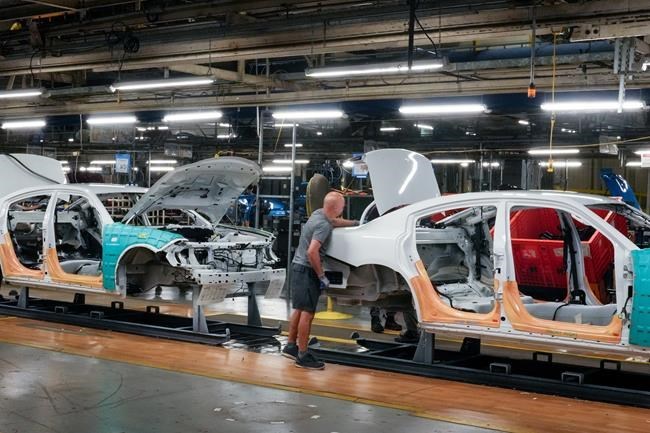OTTAWA — Canada's auto industry is experiencing a renaissance as it transitions from building gas-powered vehicles to ones that run on batteries, but some are raising the alarm over the protection of local jobs.
Southern Ontario has become a hub for foreign automakers that have invested tens of billions of dollars since 2020 to build up electric-vehicle battery plants, with help from the federal government in the form of tax credits and subsidies.
As the federal and provincial governments subsidize that growing industry, union leaders, federal Conservatives and the NDP are demanding assurances from Prime Minister Justin Trudeau that he will make sure jobs are going to Canadians.
Earlier this month, Canada's Building Trades Union called on Trudeau to intervene at the NextStar battery plant in Windsor, Ont., which is owned by Stellantis and LG Energy Solution.
The union said Canadians are being sidelined in favour of temporary foreign workers.
It said in a letter to Trudeau that 180 skilled workers in the region remain unemployed despite being available to perform work that has instead been assigned to newcomers.
It's a "brazen displacement of workers" the April 10 letter reads, "by major international corporations thumbing their noses at both the government of Canada, taxpayers and our skilled trades workers."
NextStar Energy and the federal government both say foreign workers account for just 72 jobs at the plant, and specialized equipment is being installed that Canadians will then be taught how to use.
Still, the union's executive director Sean Strickland said those are tasks that Canadian workers can already handle.
"We have 1,600 Canadian workers on the job site today, and we hope to keep it that way during the next phase of this project, where the work will turn to equipment installation," Strickland said in a statement.
"We remain able to provide the skilled labour necessary to perform this work."
On Thursday, Trudeau was in Alliston, Ont., to announce the latest multi-billion dollar investment in electric vehicles.
Honda is set to build a battery plant next to its assembly plant, which it is retooling to produce fully electric vehicles as part of a $15-billion project.
Trudeau sidestepped a question about whether the agreement with Honda includes explicit protection for Canadian workers.
"Actually the investments we're making, whether it's with NextStar, or here with Honda Motor Co., it's all about creating great jobs for Canadian workers, and that's what is actually being delivered," Trudeau said.
The company says 1,000 new jobs will be associated with the project.
But at this point, there have been no assurances that existing Honda workers in the community will be able to transition to the new jobs, said the national president of Unifor, Canada's primary auto union.
"We just need to make sure we're protecting workers in any way that we can," said Lana Payne.
When an automaker transitions its existing operation to an EV plant, that can impact up to 30 per cent of jobs in assembly plants and the auto-parts sector, Payne said, which is why it's important governments secure current workplace footprints.
Unifor has lobbied the federal and provincial governments to include protections for workers in their contracts with automakers that ensure income security, job security and the right to form a union.
Honda currently employees over 4,000 people in Alliston. They are non-unionized, but employees have held conversations around joining Unifor.
"For workers who don't have the benefit of a union, it's critically important that the government makes sure that those workers are protected through the transition period, working with employers to make sure they have those guarantees, particularly when government investments are being made," Payne said.
The Conservatives have demanded to see contracts the federal government has made with automakers, saying Trudeau cannot be trusted to protect Canadian jobs.
"We have seen before where Justin Trudeau announces massive subsidies that are supposed to create Canadian jobs, only to see him turn around and let those jobs be filled by foreign replacement workers and then lie about it," Conservative industry critic Rick Perkins and Conservative trade critic Kyle Seeback said in a joint statement.
"We can't trust that his latest announcement of $5 billion in Canadian taxpayer money to another large multinational corporation will be any different."
NDP Leader Jagmeet Singh has also called on the Liberal government to stop writing "blank cheques" without ironclad guarantees for unionized workers.
"There needs to be guarantees baked into any public dollar we spend, and should be tied to jobs and investments that benefit Canadians," Singh said.
"It should not be that we just give a blank cheque to a company and say we hope that you hire Canadians."
This report by The Canadian Press was first published April 25, 2024.
Mickey Djuric, The Canadian Press
Note to readers: This is a corrected story. An earlier version misattributed the quote about subsidies from Perkins and Seeback to a Conservative spokesperson.



